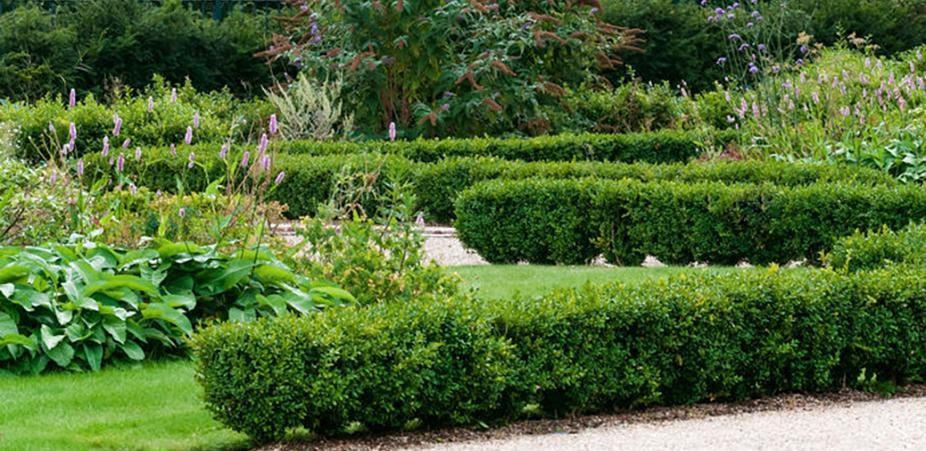We find that the most beautiful and intriguing gardens make use of hedges to create a bit of mystery, to encourage flow throughout the garden and to make unique garden rooms. Hedges can also create privacy, define spaces, add linear structure, or be used as a living fence. Hedges are shrubs that are planted so that they grow together to make a fence or border. They can be short, 1-2’ tall, and used to define spaces and create paths. Medium-growing hedges, 3-5’ tall, are nice to create garden rooms, which encourage folks to wander throughout the garden, turning corners to see what delight is around the next bend. They also provide a nice backdrop for perennials and accent shrubs. Taller hedges are generally used for privacy screens.

Consider what you’d like the hedge to look like year-round. As you know, the appearance of shrubs can change throughout the seasons! So, do you want an evergreen shrub that will look the same all year, providing consistent greenery? Or would you prefer a deciduous shrub hedge that will drop its leaves in the fall and possibly open the landscape for a larger view during the winter months? Remember that even though the leaves drop, the stems will remain to continue to delineate the space until spring.
Short hedges are often used as borders to create paths, for edging garden beds or to create segments within garden beds (like the English knot garden). Some of the best plant choices are those that grow slowly and are fairly dense, which lend themselves well to pruning. These types of plants generally have small leaves. Some good ideas include low-growing varieties of boxwood, Japanese holly and azalea.
Medium-growing hedges are a terrific way to add layers to the entire yard. It’s much more interesting to have layers of varying plant heights. Many landscapes only have a mixture of tall trees and tall privacy hedges and short accent plants. The whole mid-layer is missing! It is this mid-layer that really draws the eye and makes the garden flow. This layer is also important in that it offers protective cover for songbirds. Try hydrangea, viburnum and holly.
Hedges are most often used as tall-growing privacy screens. Classic examples include Leyland cypress, Green Giant arborvitae, Emerald Green arborvitae and skip laurel. These are very popular choices because they are all fast-growing, evergreen and easy to care for.
Most people select evergreens for privacy screens to have year-round screening. If you have space, consider planting medium-growing flowering shrubs in groups in front of the screen to add seasonal color and interest.
The most important question to ask yourself when selecting which type of plant to use when creating a hedge is: How tall do I want the hedge to grow? We all strive for low-maintenance yards. One of the easiest ways to make sure that you don’t spend a lot of time pruning is to pay attention to how tall the plant you are selecting will grow. For example, it’s better not to plant tall-growing Leyland cypress or Green Giant arborvitae in a small yard or where you only want the hedge to grow to 15-20’ tall.
Hedges can be much more than the functional “work-horses” of the yard. They can be incorporated throughout the garden to create flow, background and structure making your yard truly spectacular!
